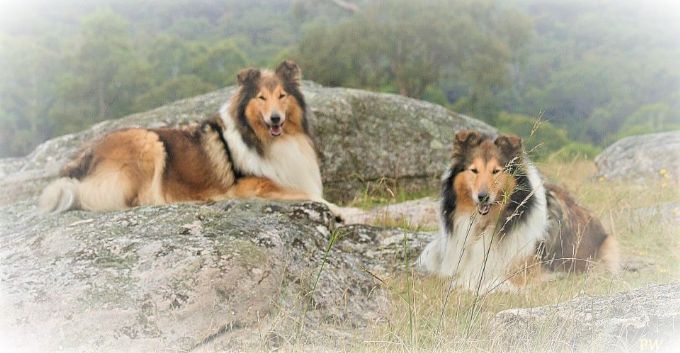About the Collie

History
The Collie was originally bred to work sheep on the rugged fells of Scotland but has since undergone many subtle changes. In the past, the Smooth Collie was adept at driving cattle in the North of England, while the thick coat of the Rough Collie offered the necessary protection for working sheep on the wild Scottish hill farms and mountains.
Today’s Collie has evolved from the old fashioned working dog into a truly magnificent specimen: a dog of great beauty, standing with impassive dignity, with no part out of proportion to the whole.
In 1881 the first breed standard was drawn up and in 1895 the Rough and Smooth Collies entered the Kennel Club’s register as fixed, registered breeds.
Over the ensuing years, breeders fixed certain characteristics, such as the coat and size; perhaps the most obvious and important changes were those made to the head shape. The Collie’s head became more elongated, lending the breed the aristocratic appearance which, along with her fascination with all things Scottish, prompted Queen Victoria’s admiration. Upon the purchase of Balmoral Castle, Queen Victoria added Collies and several other Scottish breeds to the royal kennels. Collies continued to be favoured by royalty for some time both in the UK and Russia.
Early 20th century kennels were generally owned by the very wealthy, those who were able to keep large numbers of dogs, as well as buy and sell them at very high prices. Many of these owners were also businessmen, and before long the export potential of the show Collie was recognised.
Many Collies were exported to the United States, where the breed’s best attributes were reflected in Lassie. The loyalty and adventurousness of Lassie has endeared Collies to the world; they are internationally recognised as a true family dog and ideal companion.
Appearance
The opening line of the breed standard for the Collie (Rough) sums up the breed: “The Collie should instantly appeal as a dog of great beauty, standing with impassive dignity, with no part out of proportion to the whole.”
Marked characteristics include its beautiful coat, which should fit the outline of the dog and the clean wedge-shaped head.
These words should portray to both breeder and judge a mental picture of the Collie. The three recognised colours are sable and white, tricolour and blue merle. All the above may carry the typical white Collie markings to a greater or lesser degree; however the following markings are favourable: white collar, full or part white shirt, legs and feet; white tail tip. A blaze may be carried on the muzzle, or skull, or both.
Health
The Collie is generally a very healthy breed. Responsible breeders are striving to eradicate Collie Eye Anomaly (CEA), which affects the breed and now that several genetically clear-eyed dogs have been identified, slow progress is being made. It should be said the majority of affected dogs live healthy lives with little or no impairment.
Hip Dysplasia is a problem to a lesser degree. Puppy buyers are advised to discuss health issues with breeders and seek out those who test their breeding stock and screen litters for CEA.
Temperament
The Collie makes an ideal family pet and likes to be regarded as a member of the family. It is affectionate, responding to love rather than harsh discipline. It is not a dog to be left in the yard with very little human contact. The breed performs well in obedience training as it is intelligent and relishes the chance to work with its master. However, it is a sensitive dog and must be treated accordingly when training.
Maintenance
Both Rough and Smooth Collies are double-coated. The Smooth Collie is increasing in popularity and may be better suited to those who want the Collie temperament without the grooming that is required of the Rough. But, despite what many people think, the coat of the Rough is surprisingly easy to maintain; a good brush once or twice a week will keep the pet Collie looking neat and tidy.
A rub-down with a wet flannel will help keep the breed fresh and remove surface grime, and a sprinkling of talcum powder, brushed into the coat, will act as a dry cleaning agent in between baths. However, if the Collie is to be shown, a little more coat maintenance will be required.
Despite being a medium to large breed, the Collie does not require a lot of exercise, a backyard with room for it to play in and a regular walk is all that is needed.
Suitability
Collies thrive on human company, so are well suited to families. They are easily trained in obedience and agility without harsh discipline, to which they do not respond well. They require regular exercise, enjoying a balance between romping around outdoors and lounging around on the sofa at home.
Pauline Worthington
